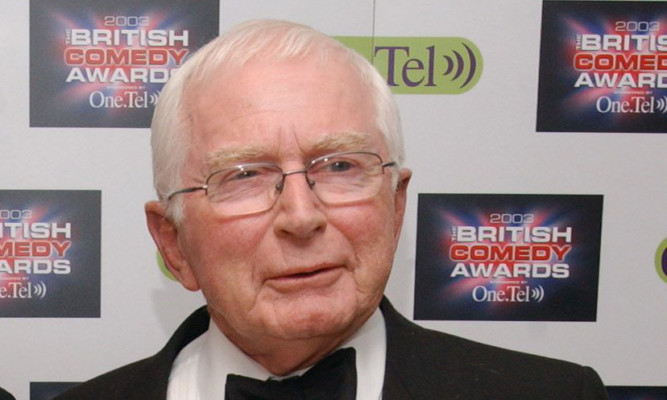
Dad’s Army creator David Croft’s wife Ann speaks about her late husband’s remarkable catalogue of work.
David passed away in 2011, but his widow Ann, who was married to him for 59 years, recounts her husband’s incredible career.
“At home, we have something we call the Archive Barn,” explains Ann, who spent much of her life living with David and their seven kids on a farm. “There, we keep many of the letters we have had over the years.
“When we did ’Allo ’Allo, we got letters from people who’d been in concentration camps. We expected them to say: ‘How could you possibly make jokes about the Gestapo?’
“But these letters told us how these people had run concert parties in concentration camps. One was from a man called the White Rabbit, a famous spy.
“He said it was absolutely true to life, the things in ’Allo ’Allo.
“I know that men like you also watched it because there was a lovely lady in stockings! Actually, I think they are about to do a tour of it, in Australia and New Zealand.
“We got very few letters from French people, although the French channel Canal Plus bought it and showed it over there.
“In fact, some Germans came over to watch it, spent the whole time roaring with laughter, and then came out saying: ‘Well, we’re not going to show it in Germany!’
“Thankfully, in the end, they did show it in Germany, and in 57 other countries.”
So not only did David Croft’s light touch with some tricky subjects go down well with the people who won the war, even our allies and enemies found it more than acceptable as comedy.
Bizarrely, however, he did run up against some awkward customers, in the shape of the very people who would first beam his shows to the nation.
“There is a programme being made as we speak, a biopic due out next year, all about how the BBC certainly didn’t want to do Dad’s Army in the first place,” Ann reveals.
“It’s a story about how the BBC cast or don’t cast a programme, maybe don’t want it and then find out it is a big success, or despite thinking something will be a smash hit, find the public don’t want it.
“We had some of those, too, because you just can’t tell what the public will want.
“Sadly, what goes wrong today is that nobody is given much of a chance. You’ll have the first episodes, the public haven’t got to know the characters yet, and they just drop the show.”
You could look at Croft’s work and say everything he put his name to turned to gold.
Nobody had more hit series, and nobody had such a run of having his finger on the comedy pulse in this country.
“There are plenty good writers, but they have great difficulty getting their shows on, because of this emphasis on youth,” Ann says.
“But young people don’t stay in to watch sitcoms!
“David used to call it Vomit Comedy, lots of lavatorial humour.
“I mean, Little Britain was brilliantly done but they had scenes we didn’t like, and David would say: ‘Well, that’s not really comedy.’
“What you want to do is make people have a few laughs and feel happy by the end of your programme, not sick.”
The most amazing thing about my chat with Ann was her choice of favourite David Croft show it definitely wasn’t one of my top three!
“You Rang, M’Lord? was very well done, very well cast,” she points out.
“And it had a very strong undercurrent of social awareness, how just after the First World War, we had that whole Upstairs Downstairs situation.
“That started to change, and I think the BBC missed a major opportunity when Downton was being shown by ITV, because they should have shown repeats of You Rang, M’Lord?
“It was set around the time where Downton has got to now, so the costumes were alike but You Rang, M’Lord had a sense of humour!”
If she sounds like she’s always ready to come out fighting her late husband’s corner, Ann really gets going on the subject of It Ain’t Half Hot Mum.
“It was racist, they say,” Ann remarks. “Well, it couldn’t have been it is a historical story about the tail end of the British Empire.
“My husband was in India at that time, a Major on Mountbatten’s staff.
“His writing partner, Jimmy Perry, was a Sergeant, running a concert party.
“So between them, they saw both sides. They really had punkawallas! OK, it may not have made the British Raj look great, but it was factual.
“To this day, I and my family get a lot of letters from the Asian actors, asking: ‘Why do they repeat these other things, but we are not getting any repeats?’
“Remember, at the time, it was the only show that actually employed lots of ethnic actors.”
We love her loyalty and the fact she gave up an awful lot of her marriage to let David write all his hits!
“I didn’t see him terribly much at times,” she laughs, “but I must have seen a fair bit of him, because we did have seven children together!
“David was always busy, writing the next series, and it is wonderful that people still love his shows so much.”

Enjoy the convenience of having The Sunday Post delivered as a digital ePaper straight to your smartphone, tablet or computer.
Subscribe for only £5.49 a month and enjoy all the benefits of the printed paper as a digital replica.
Subscribe